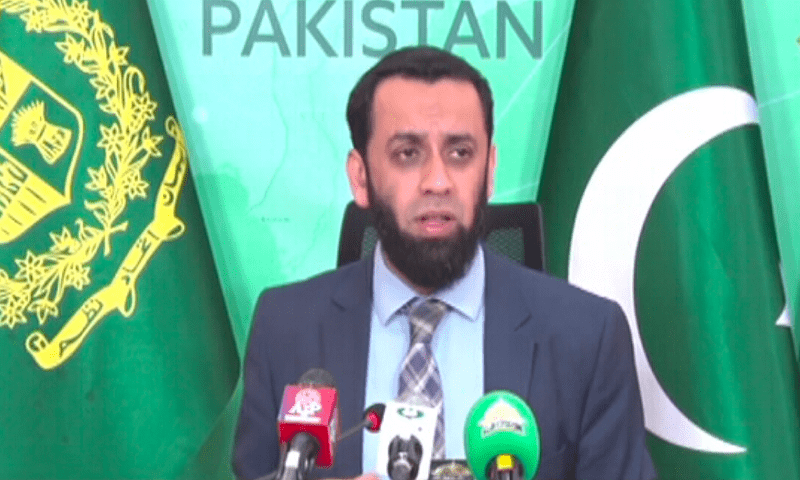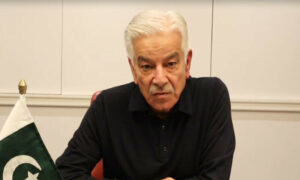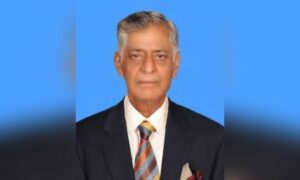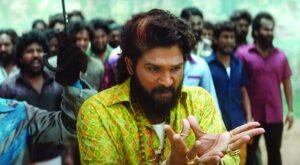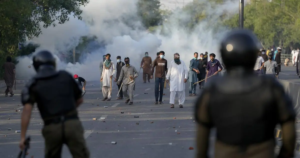• Tarar says Centre has decided ‘in principle’ to proscribe the party, awaiting wider consensus
• Coalition partners lash out at Imran’s ‘admission’ regarding protest outside GHQ
• PPP files fresh petition before SC seeking review of reserved seats order
ISLAMABAD: In the wake of what is being seen by many as an admission of guilt by Imran Khan, the government’s efforts to ban the opposition PTI from the political mainstream seem to be gathering steam.
A day earlier, media reports said the PTI founder had, while speaking to journalists at Adiala jail, acknowledged that he had called for a protest outside the GHQ if he was arrested.
While the party and his legal team have been at pains to clarify that he meant a “peaceful protest”, PTI’s opponents have pounced on the statement, citing it as a vindication of their misgivings about the party.
Reacting to the ‘admission’, Information Minister Atta Tarar said the government had decided, in principle, to place a ban on the PTI. “We have principally decided to ban PTI, but waiting for a broader consensus (among ruling allies) to impose the ban,” he said during an appearance on Geo News.
Earlier, the government’s stance had been that consultations were underway among the ruling allies regarding the decision to ban the opposition party.
But now, even the PPP seems to have been swayed, approaching the Supreme Court to challenge the July 12 verdict that awarded reserved seats to the PTI and recognised it as a parliamentary party.
Review petition
The PPP, which instituted the review petition through senior counsel Farooq H. Naek, seems specifically aggrieved with the SC’s interpretation within the meaning of Article 51(d)(e) as well as Article 106 that the PTI “was and is” a political party that secured or won general seats in the national and provincial assemblies in the Feb 8 general election.
This is the third such petition, as earlier the PML-N on July 15 moved the SC seeking review of the order contending that the full bench, instead of interpreting the Constitution, entered into the domain of legislation.
Likewise, three women members elected on the reserved seats from PML-N had also filed review petitions.
The PPPP reiterated that PTI neither filed any case before the ECP, nor before Peshawar High Court (PHC), or before the Supreme Court, hence it is not entitled to any relief, let alone a relief which was not even pleaded.
Moreover, it added, the short order has not noted that 80 MNAs had filed their nomination papers as independent candidates and then as independent candidates joined the SIC. “None has even come forward to state otherwise,” it pointed out, arguing that the assumption in the short order under review that the MNAs were PTI candidates was liable to be reviewed.
According to the July 12 short order, 41 returned candidates were given a 15-day period to join any political party even though they did not show affiliation with PTI even in one of the columns of the list submitted by the ECP.
This novel procedure is in stark contradiction to the Constitution, the Elections Act, 2017 and the settled jurisprudence, the petition contended.
The petition also said the short order was against Rule 92 (6) of the Election Rules, 2017, which state once an independent candidate joined a political party, there was no option to recall or cancel the same.
Also, the short order was against the settled principles of interpretation of the Constitution since by carving out a procedure that was not provided under the Constitution, the short order might have gone into the realm of creating and not just interpreting the constitution that was against the SC jurisprudence, the petition said.
Logic behind PPP review
The submission of the review petition came as a surprise for many, since it was just three days ago that the PPP had counseled the PML-N to reconsider its decision to move the SC for a review, since its leadership believed that the government might not get any relief in the case.
A key partner in the ruling coalition, the PPP’s suggestion came during a meeting held at the Presidency on July 19, in the backdrop of complaints that the ruling PML-N had not taken them on board regarding its plan to deal with the PTI.
A senior PPP leader privy to developments told Dawn on condition of anonymity that opinions within the party were divided over the issue of filing the review petition.
The leader said their top brass had allowed Mr Naek to file the petition after a formal request by the PML-N in this regard, which wanted the PPP to become party to the case since it was part of the ruling coalition.
Moreover, the source said, those in support of moving the petition were of the view that the PPP should do so to ensure parliament’s supremacy and send a message to other institutions to stay within their constitutional limits.
The PPP leader said that although the party had opposed the idea of moving the review petition in the meeting at the Presidency, they had also assured the PML-N that they would support them if it decided to go ahead.
The source said PML-N leaders had told them that they were not too hopeful of a favourable decision from the apex court, but said that they were doing it only to bring their point on the record.
Published in Dawn, July 24th, 2024

